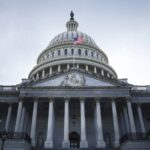By Nathan Worcester
The House Transportation and Infrastructure Committee approved a joint resolution against the Biden administration’s new Waters of the United States (WOTUS) rule during a Feb. 28 markup, the latest in an ongoing dispute as to federal authority over the nation’s waters.
“I would argue that this may be the most important vote, one of the biggest votes that we cast this Congress,” said Rep. David Rouzer (R-N.C.) prior to the vote.
Rouzer, Committee Chair Sam Graves (R-Mo.), and more than 140 other members of Congress first introduced the resolution in the House on Feb. 2.
They did so in conjunction with the introduction of identical legislation in the Senate by Sen Shelley Moore Capito (R-W.Va.).
The joint resolution would render Biden’s veto pen useless if it receives two-thirds of the vote in both chambers. For now, Democrats control the Senate, while Republicans have a narrow edge in the House.
WOTUS has been a flashpoint for years.
Under the Clean Water Act, “waters of the United States” are subject to federal regulation. The original law defined those waters as the country’s “navigable waterways.”
Expansive views of WOTUS, though favored by many environmentalists, are seen as a serious impediment by many farmers, ranchers, and other landowners, who want it narrower in scope.
Former President Donald Trump’s 2020 WOTUS rule was vacated by an Arizona judge in August 2021.
The joint resolution aims to thwart President Biden’s new WOTUS rule, which was published in January 2023 after being announced on Dec. 30, 2022.
“Farmer after farmer in my district talked to me about the litigation that they’ve become mired in over the WOTUS definition, and their frustrations with simply trying to put in a pond, or improve their own land,” Graves said.
While Graves argued that Biden’s WOTUS rule conflicts with the intent of the Clean Water Act, Democrats had a different take on Republicans’ frequent WOTUS challenges.
“Congressional efforts such as this, as well as the previous administration’s rulemaking and the revisionist tendencies of conservative judges on the Supreme Court, all share a common goal—to weaken the federal protections of our nation’s waters and benefit those who are polluting rivers, streams, and wetlands,” said the committee’s ranking member, Rep. Rick Larsen (D-Wash.)
The markup follows a hearing earlier this month of the committee’s Subcommittee on Water Resources and Environment, chaired by Rouzer.
At the Feb. 28 hearing, Rep. John Duarte (R-Calif.) described his headaches as a farmer who has dealt with legal battles under a broader definition of WOTUS.
“This Clean Water Rule threatens our nation’s food supply,” he added, saying it would “effectively remove millions of acres of viable farmland from our food production system that could otherwise be deployed in the future.”
“What we need in Arizona is certainty—and this resolution provides less certainty, not more,” said Rep. Greg Stanton (D-Ariz.), a lawyer who formerly served as mayor of Phoenix.
Stanton argued that the less expansive Trump WOTUS rule wasn’t fitted to the realities of his dry southwestern state, “where every drop of clean water counts.”
“Clarity needs to be for the customers, the people, not the convenience of the freaking government,” said Doug LaMalfa (R-Calif.), another farmer-congressman who voiced strong support for the joint resolution.
“This is another attack on rural America,” he added.
His concerns were echoed by Rep. Marc Molinaro (R-N.Y.), who claimed the Biden rule amounted to a “taking by the EPA [Environmental Protection Agency.]”
Rep. Grace Napolitano (D-Calif.), an opponent of the measure, said it “places arbitrary and likely impossible timelines on states to act on permit requests.”
“My friends across the aisle may not realize this, but this bill may lead to greater numbers of project rejections, as the state is pressured to respond without the time to fully analyze the project,” she said.
Other Items Passed
Before considering WOTUS, Graves and his fellow representatives approved less contentious pieces of legislation.
Those items included the committee’s Authorization and Oversight Plan—a roadmap for the ongoing Congress.
“This will be a work committee and [is] not going to be a show committee,” Graves said.
The plan swiftly passed the committee, which then went on to consider its Views and Estimates for Fiscal Year 2024.
“We will aim to alleviate ongoing inflation, energy, and supply chain problems,” Graves said.
The committee next passed House Resolution 152.
That resolution supports the state-level “move over” laws that require drivers to put a lane between themselves and roadside emergency response efforts, or, if they cannot move, to pass responders slowly and with great care.
“Tragically, in 2022, 50 traffic incident management responders were killed in roadside collisions. Those deaths are preventable,” Larsen told his colleagues.
House Concurrent Resolution 15, the next item passed by the committee, facilitates a national memorial service for law enforcement at the U.S. Capitol sponsored by the National Fraternal Order of Police.
“It is critical for us to recognize that police officers are doing an extremely difficult and dangerous job, day in, day out, hour by hour, 24/7, 365, just to keep our citizens safe,” said one of the bill’s cosponsors, Rep. Scott Perry (R-Penn.)
In addition, the committee passed a bill to rename a federal building at the Fermi National Accelerator Laboratory after physicist Helen Edwards along with capital investment and leasing program resolutions from the General Services Administration.
“You’ll notice that every lease resolution we are considering today has significant space reductions or is a short-term lease needed to consolidate agencies into more efficient lease space.
“It’s simple: if space is not being used, taxpayers should not be paying for it,” Perry said.
The committee also passed the Water Quality Certification and Energy Projects Improvement Act of 2023.






